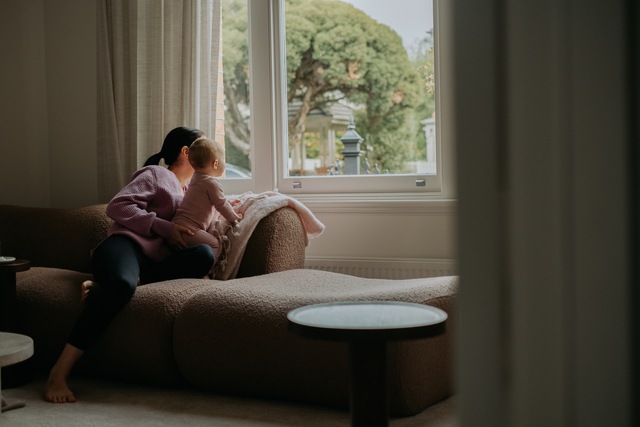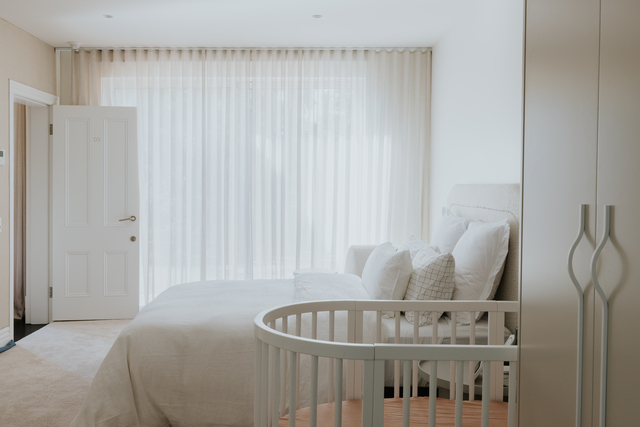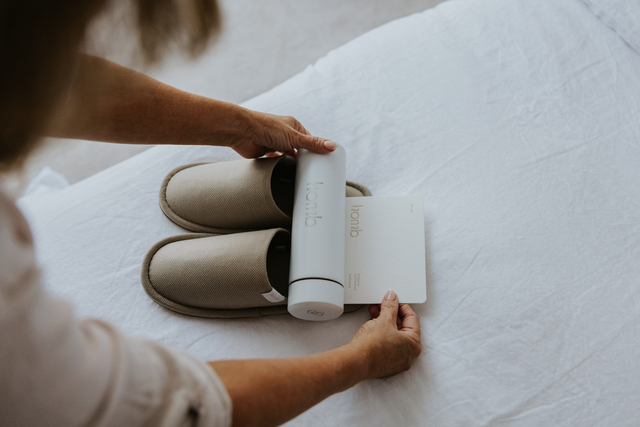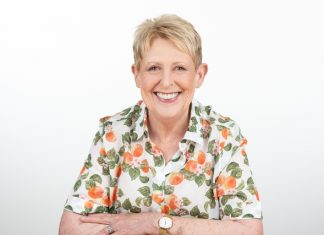By Casey Neill
Homb nurtures and empowers new mothers, striving to prevent postnatal depression and anxiety.
Founder Larissa Leone is also working to change the ubiquitous baby-first narrative and make mums the priority.
Speaking to Kids, Larissa pointed to baby expos as an example.
“There’s no postpartum stands,” she said.
“Everything is for the baby. Everything is still for the baby.
“All they want is your love and your attention. Spend your money on yourself being able to provide that wholeheartedly.
“It’s really difficult to convey that knowledge and information because (pregnant) women don’t want to know. They are focused on the fluffy stuff.
“The system or society doesn’t value that. What it now seems is indulgent.
“Homb has been referred to as a postpartum hotel.
“For the most part, sure, that’s what it is. But it sounds so transactional.
“There’s so much more depth to what we offer and what we provide.
“This is a solution.
“The healthcare system has to get on board.
“The spend on the recovery and the response to postnatal depression is huge compared to the spend on preventative care.
“We’ve got stats staring us in the face, on postnatal depression and anxiety. One in five.
“We seemingly have all of this help but the stats are still increasing.
“Is it that we’re talking about it more and women are coming forward more, or is it that the money raised isn’t going to the right areas?”
Homb was born from Larissa’s experience after welcoming her first child.
“I had a very successful business, I had all my ducks in a row, I was very in control of everything in my life,” she said.
“I had a great pregnancy, no complications. Even my birth was great, there was nothing overly stressful or traumatic about that.
“But from that first moment, I just felt very out of control and very ‘this person now is relying on me and I don’t know if I can do this, am I going to do this well enough?’.
“There was already a lot of self-judgement.
“I was reading every book that I could possibly get my hands on to tell me how it was all going to work out.
“When it didn’t, it really catapulted me into a world of anxiety and really deep worry.
“It just continued to spiral, the more I tried to cover all those feelings up and tried to integrate into society.”
She reached out to her husband for help when her daughter was about six months old.
“I was having very dark thoughts. I was thinking about self-harm,” she said.
“I thought ‘if I hurt myself enough but not too much then I can go to hospital and have a couple of nights where I’m not with the baby and I can have some sleep and some rest’.
“I knew somewhere in me that that wasn’t normal.”
They contacted a mothercraft nurse – who cares for newborns and provides advice and training to parents – and waited four weeks to see her.
“At that point it was still not help for me, it was help for the situation,” Larissa said.
“With the benefit of hindsight, I should have been straight to a psychologist.
“It’s interesting that the go-to was still not caring for me as the mother.
“I said to my husband, ‘why is there nowhere that I can go that I can be helped through this without it being a hospital?’.
“I was just astounded that there was nowhere I could go that was a more homely environment.”
Larissa was retrospectively diagnosed with postpartum depression after having her son two years later, and her desire to affect change intensified.
“I just didn’t want any other woman to experience what I had experienced,” she said.
“The health care system has pulled us away from our innate knowing of how to birth.
“Largely I think we’ve over-medicalised something that is innately natural.
“It’s just become a huge marketing thing and women don’t trust themselves anymore.
“The essence of Homb is really trying to bring back that confidence and trust within a woman to have the confidence to make those decisions for herself, with the guidance and support of people who are intrinsically involved in maternal health.”
Homb’s team includes registered nurses, midwives, lactation consultants, naturopaths, nutritionists, doulas, birth trauma practitioners, gentle sleep consultants, and more.
“We are mother-led,” Larissa said.
“If a mother has a way she wants to do things we follow that.”
Women who need support have the opportunity to access the service at low or no cost.
“Starting the charity arm was a huge part of it for me, because I understood the costs – having midwives and incredible staff doesn’t come cheaply,” Larissa said.
“I knew it was not accessible for the majority of women.”
The feedback has surpassed her expectations.
“It’s been quite extraordinary and certainly the most fulfilling thing I will ever do in my lifetime,” she said.
“Just to know we’re affecting change and helping women is certainly enough for me.
“Consistently, they feel like they can breathe again.”









